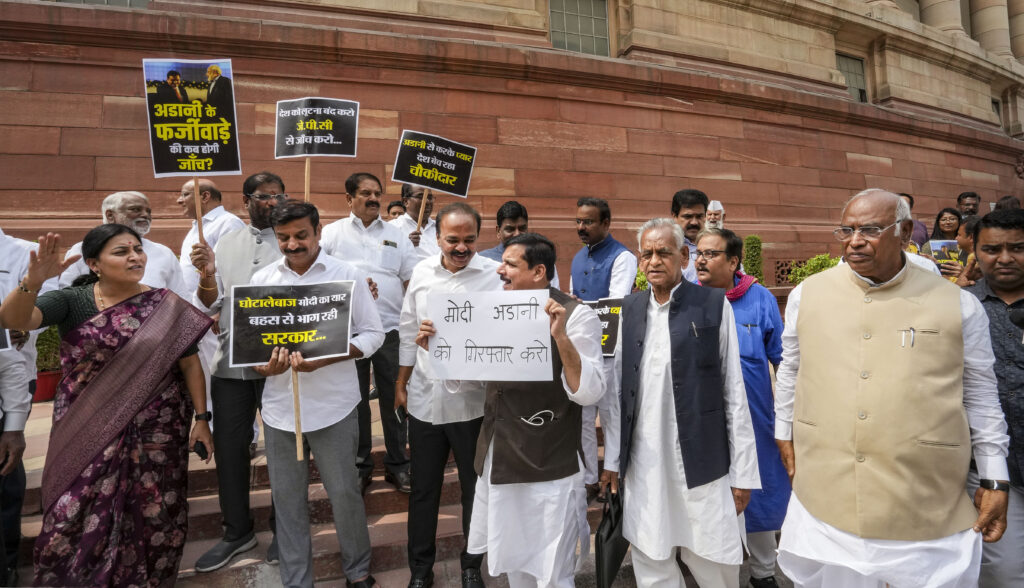The second week of the Winter Session of Parliament has come to a standstill, raising critical questions about the balance between opposition rights and national priorities. While healthy debate and dissent are cornerstones of democracy, frequent disruptions that stall legislative proceedings appear to do more harm than good, especially when taxpayer money and pressing national issues are at stake.
The spectacle of disrupted parliamentary sessions is not new, but its frequency and impact on governance have grown alarmingly. By boycotting and stalling the House, opposition parties disregard their mandate to represent the electorate in meaningful debates. Instead, walkouts and protests outside Parliament dominate the scene, often appearing disconnected from the core concerns of the public.
One such disruption revolves around the Congress party’s demand to discuss allegations involving businessman Gautam Adani in connection with a New York court indictment. Procedural rules bar discussions on foreign court matters in Parliament, making the opposition’s insistence more about theatrics than constructive debate. Compounding this irony is the apparent disinterest of Congress allies like the Trinamool Congress (TMC) and Samajwadi Party (SP), who refrained from participating in these protests.
To counter the Congress’ relentless focus on Adani, the BJP-led NDA has highlighted alleged links between Sonia Gandhi and NGOs tied to billionaire George Soros, whose controversial global influence is well-documented. While such claims carry political weight, they too skirt the boundaries of parliamentary relevance. The question remains: why does the Congress avoid debating these counter-allegations in Parliament? An open discussion on both matters could clarify facts for the public, but the deadlock continues.

The disruption of Parliament undermines key legislative priorities like the Wakf Board Amendment Bill, One Nation, One Election, and the Uniform Civil Code (UCC). These reforms, if implemented, promise transformative impacts:
- Wakf Board Amendment Bill: The controversial powers granted to Wakf Boards under Congress-era laws have led to widespread misuse, with private and government properties being claimed as Wakf assets. Farmers in Karnataka, for instance, face legal limbo due to Wakf Board assertions. Addressing these grievances through legislative reform is crucial.
- One Nation, One Election: Synchronizing Lok Sabha and state assembly elections would minimize frequent election cycles, allowing governments to focus on governance for most of their term.
- Uniform Civil Code: A UCC would ensure consistent legal standards across faiths, streamline judicial processes, and reinforce equality before the law.
Despite a clear majority in Parliament, the government’s reluctance to push these bills forward, citing procedural ethics and opposition non-cooperation, raises eyebrows. Parliamentary Affairs Minister Kiren Rijiju’s assertion that the government avoids bypassing democratic norms, while commendable, risks appearing as a convenient excuse.
The Modi government must take proactive steps to fulfill its promises. With only a week left in the Winter Session, the BJP should leverage its majority to introduce and vote on critical bills. Opposition absenteeism during debates would expose their priorities and highlight the government’s commitment to national interests.
Moreover, engaging with parties like the TMC and SP—who seem more inclined toward constructive discussions—could ensure a smoother passage of key reforms. Let the opposition’s decision to participate or abstain speak for itself.
While the opposition’s frequent disruptions paint a grim picture of democratic accountability, the government bears a greater responsibility to ensure governance does not grind to a halt. Pushing forward with reforms and exposing opposition obstructionism in the process could help rebuild public trust. Time is running out for the Modi administration to show that governance can rise above political gridlock. After all, the electorate demands progress, not excuses.






